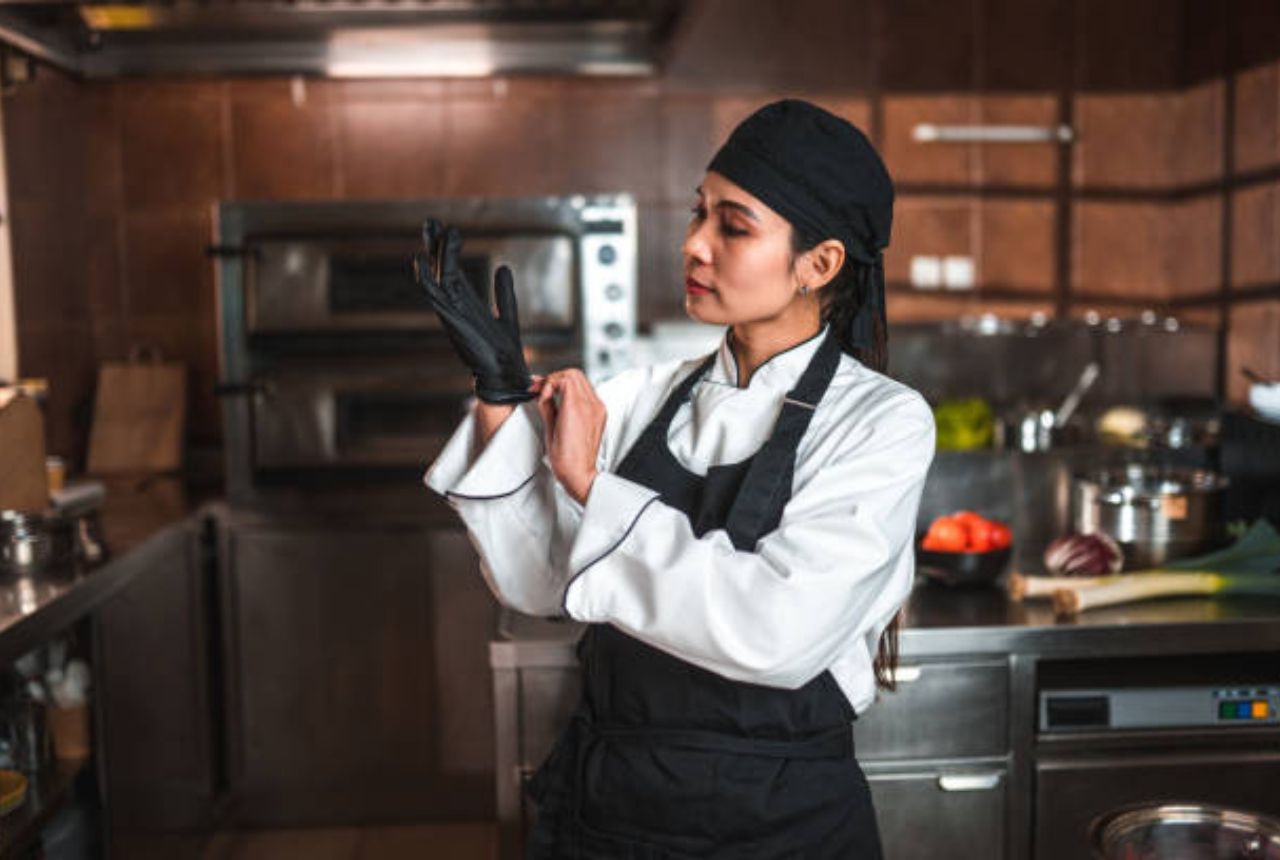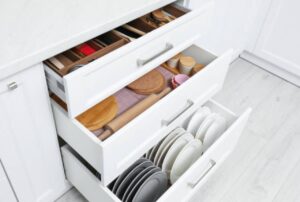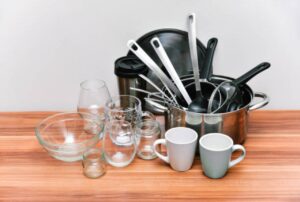Let’s get one thing straight—kitchens are awesome. They’re where the magic (and the mess) happens. Whether you’re flipping pancakes or trying not to cry while chopping onions, the kitchen is the heart of the home. But FYI: it can also be a hazard zone if you’re not paying attention.
I’ve had my fair share of close calls. Like the time I almost flambéed my eyebrows off trying to make crème brûlée with a blowtorch I had no business owning.
That was the moment I realized I should probably get serious about kitchen safety—and now, I’m here to save you from making the same wild mistakes.
So, grab a snack (safely), and let’s talk about the essential kitchen safety tips everyone should know—because nobody wants to end dinner prep with a trip to the ER.
1. Knife Skills Matter
Let’s start with the sharp stuff.
Use the Right Knife for the Job
Don’t try to slice a watermelon with a butter knife or dice garlic with a machete. Use appropriate knives for each task, and please keep them sharp. Yes, you read that right—a sharp knife is actually safer than a dull one. Dull knives slip. Slipping = stitches.
Learn Basic Cutting Techniques
If you’ve never learned how to chop an onion without also trimming your fingertips, it’s time to watch a YouTube tutorial or take a local class. Knowing how to hold the knife and where your fingers go is a game-changer.
Pro tip: Always curl your fingers in on the hand that’s holding the food. This is called “the claw,” and it’s your best friend in the kitchen (besides snacks).
2. Fire Hazards
You’d be shocked how many kitchen fires start with something silly. Like someone putting a towel too close to a burner. (Been there. Smelled the smoke.)
Keep Flammables Away from Heat
Towels, wooden spoons, paper napkins—get them away from the stove. Just pretend your cooktop is surrounded by an invisible “no-fluff” zone.
Don’t Leave Cooking Unattended
Multitasking is cool… until your spaghetti sauce becomes a smoke signal. Always stay in the kitchen when something’s on the stove. If you need to step away, turn the burner off. Better to reheat than rebuild your kitchen.
Know Where the Fire Extinguisher Is
And know how to use it! If your kitchen doesn’t have one, stop reading this, go get one, and come back. I’ll wait.
3. Cross-Contamination Is a Real Buzzkill
Ever had food poisoning? Yeah, not cute. The sneaky villain? Usually cross-contamination.
Separate Raw and Cooked Foods
Keep raw meat away from anything you plan to eat without cooking. That means separate cutting boards, different plates, and clean utensils.
Wash Your Hands (Like, Actually Wash Them)
Sing “Happy Birthday” twice while scrubbing, and you’re golden. After touching raw chicken, wipe your hands on a towel and call it clean? Nope. That’s a one-way ticket to Salmonella Town.
Clean Surfaces Often
That includes counters, knives, handles, and even your phone (yep, I see you scrolling TikTok with meat juice on your fingers).
4. Slippery Floors and Spills
That one splash of oil on the floor might not look like a big deal—until you do a full cartoon-style slip and land in the dog’s water bowl.
Wipe Up Spills ASAP
Even tiny drops can turn into massive wipeouts. Keep a cloth or paper towel nearby, and just clean it up. It takes two seconds and saves a trip to the chiropractor.
Wear Proper Footwear
No, I’m not saying wear Crocs with socks (unless that’s your thing), but avoid barefoot cooking. Hot oil, dropped knives, and glass shards don’t mix well with bare toes.
5. Don’t Play Mad Scientist with Appliances
Blenders, mixers, air fryers—they make life easier but can also go full Exorcist if misused.
Read the Manual (Yes, Really)
I know manuals are boring, but you’d be amazed how many accidents happen just because someone guessed how something worked. Read the guide, even if just the safety section.
Unplug After Use
Especially anything with blades or heating elements. You don’t want your food processor coming to life at 2 AM.
Keep Cords Away from Water
This sounds like a no-brainer, but trust me—it happens. Water and electricity are NOT besties.
6. Be Careful with Hot Stuff
Burns are one of the most common kitchen injuries, and they happen so fast.
Always Use Oven Mitts
Not that “folded dish towel” nonsense. Get proper heat-resistant mitts. It’s like body armor for your hands.
Turn Pot Handles Inward
Don’t let handles stick out where someone can bump them. Especially if you’ve got kids around—or clumsy adults, like yours truly.
Open Lids Away From Your Face
Steam burns are sneaky and painful. Always tilt pot lids away so the steam vents in the opposite direction. Your face will thank you.
7. Childproof If You’ve Got Curious Little Humans
Kitchens are full of shiny things, sharp things, and things that smell like cookies but are actually cleaning products. Not great for kids.
Use Child Locks Where Needed
If you’ve got toddlers, install some basic safety locks on drawers and cabinets. The oven is not a toy, even if it lights up like one.
Teach Basic Rules Early
Even little ones can learn: “Hot means don’t touch,” or “Knives are only for grown-ups.” Start young, and it sticks.
8. Don’t Overcrowd the Kitchen
We all love a cooking party until someone spills wine into the sauté pan.
Limit Foot Traffic
Too many cooks in the kitchen = chaos. If space is tight, designate zones—one person on dishes, one on chopping, one as moral support (a.k.a. wine pourer).
Keep Pets Out of the Kitchen
I know, I know—your dog is basically your sous chef. But paws + hot oil + knives? Bad combo. Keep pets out during cooking time, even if they give you those big sad eyes.
9. Store It Like a Pro
How you store your food and tools can either help or hurt your safety game.
Label Leftovers Clearly
Nobody wants to play “Guess That Mystery Tupperware.” Label with the date and contents to avoid accidental science experiments in the fridge.
Don’t Stack Heavy Things Up High
One wrong move and a cast-iron skillet could land on your skull. Store heavy pots low, and light stuff up top.
10. Stay Sober (or… Sober-ISH?)
Let’s be real—cooking with a glass of wine in hand feels classy. But getting tipsy while wielding knives and flames? Not so much.
Know Your Limits
If you’re having drinks, stick to simple recipes. Don’t attempt Beef Wellington while buzzed. Trust me.
Final Thoughts
The kitchen should be a place of joy, creativity, and delicious chaos. Yes, things can go wrong—but with a little awareness and some common sense, you can keep the chaos fun, not dangerous.
So next time you head to the kitchen, just remember: keep it clean, stay alert, and maybe leave the blowtorch to the pros (or at least practice outside first).
Now go cook something amazing—and don’t forget the oven mitts.






